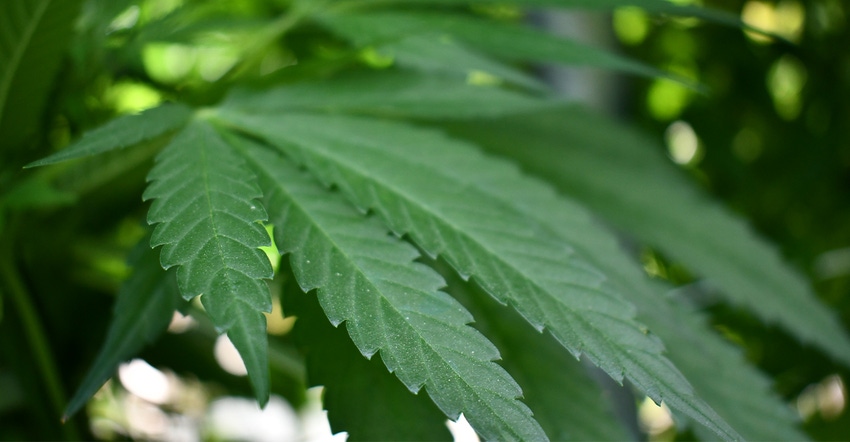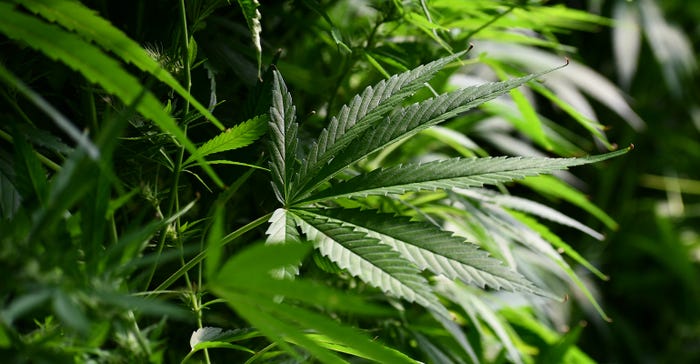
Looking at a hemp plant or a picture of the plant, you may think it looks just like marijuana, and you would be right. The key difference between hemp and marijuana is the THC content, which is the active ingredient of cannabis, but both hemp and marijuana are two different names given to cannabis.
Cannabis containing 0.3% or less THC content by dry weight is referred to as hemp while a THC content any higher is referred to as marijuana. THC content is the component that gives the “high” associated with marijuana while hemp has no such properties.
Hemp is a multi-use crop. From flooring to clothing, industrial hemp can be used to make a variety of products. (Credit: Alaina Dismukes)
During a recent interview with Farm Press, David Cornett and Brian Bolyer discussed the difference between these often-confused versions of cannabis and why farmers should consider adding hemp to their rotation. Cornett is the agronomist for both Okhish Mound Farm LLC and the National Hemp Growers Cooperative, while Bolyer is the owner of Okhish Mound Farm LLC and the seed coordinator of the Co-op.
What makes hemp, hemp?
While both hemp and marijuana are essentially the same plant, cannabis, the distinction lies in the seed genetics and how the plant is cared for.
"The difference between hemp and marijuana is THC content, and THC is governed by genetics," Cornett said. "Some varieties have the genetics to generate more THC, which is why we have to be careful about what gets planted and why it can be bred to have lower levels of THC.
"From purely a scientific standpoint, they are the same plant. The scientific name is cannabis sativa for both. The distinction is purely a legal description only, which sets the THC level at a 0.3% dry weight. Anything at that level or lower is effectively not going to get you 'high.'"
Hemp, in contrast, is grown for its medicinal purposes as well as the many textile products that can be made from it.
"Another difference is how the plant is grown," Bolyer said. "If you wanted higher THC, you would stress train the plants from an early age. As the plant stresses, it creates more THC. For hemp, on the other hand, you would keep environmental stressors to a minimum.
"THC content is more of a concern for the CBD oil industry. For fiber and grain, a lot of your varieties or seed companies guarantee them not to contain high levels of THC. Either way, the state comes and tests the crop to ensure the crop has the correct THC levels."
"The difference between hemp and marijuana is THC content, and THC is governed by genetics," David Cornett said. (Credit: Alaina Dismukes)
Hemp for fiber and the textile industry is different from the CBD oil industry in how it is grown and harvested.
"For your big farms, depending on whether you are growing for grain or fiber, you are going to want somewhere between 20 and 50 pounds of seed per acre," Bolyer said. "When you grow for fiber, because of the density of the seed distribution, you are going to get an exceptionally long, tall fibrous plant. It looks more like a field of bamboo."
Products made from hemp
Hemp is a multi-use crop. From flooring to clothing, industrial hemp can be used to make a variety of products. There are several up-and-coming companies as well as corporations using hemp in new ways.
"Hemp Wood is a company out of Kentucky, which is making hemp flooring," Bolyer said. "Also, there is another company called Dama Distributing, and they are taking the cellulose from the plant out of the biomass and creating biodegradable plastics out of it, so it is a one-time-use plastic.
"With the fibers of the hemp stalk, some companies are making a cotton-hemp blend for clothing. Currently, this is an expensive process, so it will be a few years before it is more available for smaller companies. It is already in place within bigger companies with the ability to invest in that type of infrastructure. I do not think it is going to replace cotton, but I think it will be added to it to make a cotton-hemp blend.
"Once it is well established, the textile industry could become the backbone of the hemp industry. Hemp is the only crop I know that you can feed yourself, clothe yourself, and build shelter from. Plus, there are all the medicinal benefits."

"Once it is well established, the textile industry could become the backbone of the hemp industry," Brian Bolyer said. (Credit: Alaina Dismukes)
Other products that can be made from hemp include rope, paper, insulation, and food.
"Also, the woody interior of hemp can be directly fed into the recipe for something called hempcrete, which is a non-permanent but durable version of concrete," Cornett said. "The fibers can even be made into a substitute for fiberglass."
Hemp for crop rotation
From an agricultural standpoint, it makes a substantial addition to crop rotation.
"The hemp plant is somewhat unusual in that it has a very long, deep taproot system," Cornett said. "Soybeans have a taproot system, but it is not too deep, and corn has a fibrous root system. The advantage to hemp's long taproot system is it penetrates the soil to a deeper degree than most root systems."
Hemp helps to break up compaction deeper in the soil.
"Hemp also can amend the soil," Cornett said. "I have heard anecdotal stories of how it enriches the soil differently. Soybeans and peas put nitrogen into the soil, but hemp puts carbon back into the soil."
Since hemp is a newer commodity to many states, there is still research in the making on best practices.
"We are having to rewrite the book on hemp because there is little to no research done on it," Bolyer said. "It was grown in the past, but all that knowledge has been lost. We are having to figure it all out again as we go, and it has all been a learning process for everyone.
"Okhish Mound Farm is a member of the National Hemp Growers Cooperative, and we are working with the co-op to get some seed trials started and do an educational program to help teach farmers how to grow it. We also want to help provide information about what pesticides can be used and how to harvest hemp as well as where the crop can be sold."
To learn more about growing hemp or if interested in taking part in seed trials, contact Okhish Mound Farm or the National Hemp Growers Cooperative. To contact Okhish Mound Farm, call (318) 510-9606 or email [email protected]. To contact the National Hemp Growers Cooperative, call (601) 301-5550 or email [email protected] or visit their website at https://nationalhempcoop.us/.
Read more about:
Crop RotationAbout the Author(s)
You May Also Like




